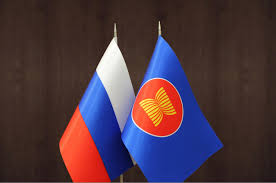
They say it can open new markets for exporters, but warn that logistical challenges and geopolitical hurdles must be addressed for real progress.
The Asean-Russia Strategic Programme for Trade and Investment Cooperation is poised to revitalise economic ties between the regional bloc and Moscow, say analysts.
With its details still emerging, Azmi Hassan of Akademi Nusantara said the trade deal comes at a time when Asean nations are actively seeking alternative markets amid rising global trade tensions.
“Asean sees a great opportunity because with US president Donald Trump’s tariffs, the region needs to find new markets. China is already a well-established partner, and discussions on an Asean-European Union free trade area are still ongoing.
“However, Russia is creating a new opening for Asean to export more products, especially agricultural goods. We can also increase electronics exports and send more to the Russian market,” he told FMT.
Azmi said Malaysia is also keen for a more independent trade policy, given its stance on US sanctions, particularly after the state department blacklisted six local electronic firms last year over alleged links to Russia.
The six Malaysian companies are Zeolite Mansford Sdn Bhd, Maxtrum Capital Sdn Bhd, Centrina United Sdn Bhd, Gyntec Carbon Sdn Bhd, Moralability Industry Sdn Bhd, and Melix Global Sdn Bhd.
“We previously made it known that US sanctions on Russia are unilateral and do not concern us. Despite the pressure, some of our companies are still trading with Russia,” said Azmi.
Malaysia’s growing bilateral engagement with Russia was underscored by Prime Minister Anwar Ibrahim’s visit from May 13 to 16, during which he met president Vladimir Putin to discuss trade and investment cooperation.
It was reported that Russia and Malaysia would strengthen energy ties, including potential nuclear cooperation, following similar moves by Vietnam.
Room for growth
Elena Burova, a research fellow at the Institute of China and Contemporary Asia, said Russia has shown a strong intent to grow its trade footprint in Southeast Asia.
“Despite facing severe sanctions and logistical challenges, it managed to grow trade with Indonesia, Malaysia and Singapore.
“According to ASEANstats, trade volume between Russia and Asean reached US$17.7 billion in 2024, which is 13% more than in 2023. However, it still hasn’t recovered to the 2021 peak of US$18.1 billion,” she told FMT.
Burova, however, said that Asean-Russia trade remains hampered by transport links, heavy reliance on Singapore as a trade hub, and Asean’s default focus on China, the US, and the EU.
She described this economic dimension of Asean-Russia relations as “one of the weakest within the partnership”.
Still, Burova said that growing US economic coercion and escalating US-China trade tensions could disrupt the global value chain and create openings for Russia to deepen cooperation with Asean.
“Russian enterprises in sectors where Russian goods are competitive can become one of the elements of these chains,” she said.
Ian Storey, senior fellow at the ISEAS-Yusof Ishak Institute, however, urged against overestimating Russia’s potential in Southeast Asia.
He said Russia has been a relatively modest economic player in the region compared to Asean’s dominant trade partners, especially in infrastructure or FDI-heavy sectors.
“As Russia is neither a major economic nor military player in Southeast Asia, there are limited opportunities for Asean and its member states (to deepen economic ties),” he said.
During Anwar’s visit to Moscow, his political secretary, Kamil Abdul Munim, said Malaysia and Russia were actively addressing sanctions-related challenges, as bilateral trade continues to grow, driven by increasing interest from both governments and the private sector.
Source: Free Malaysia Today
Share: